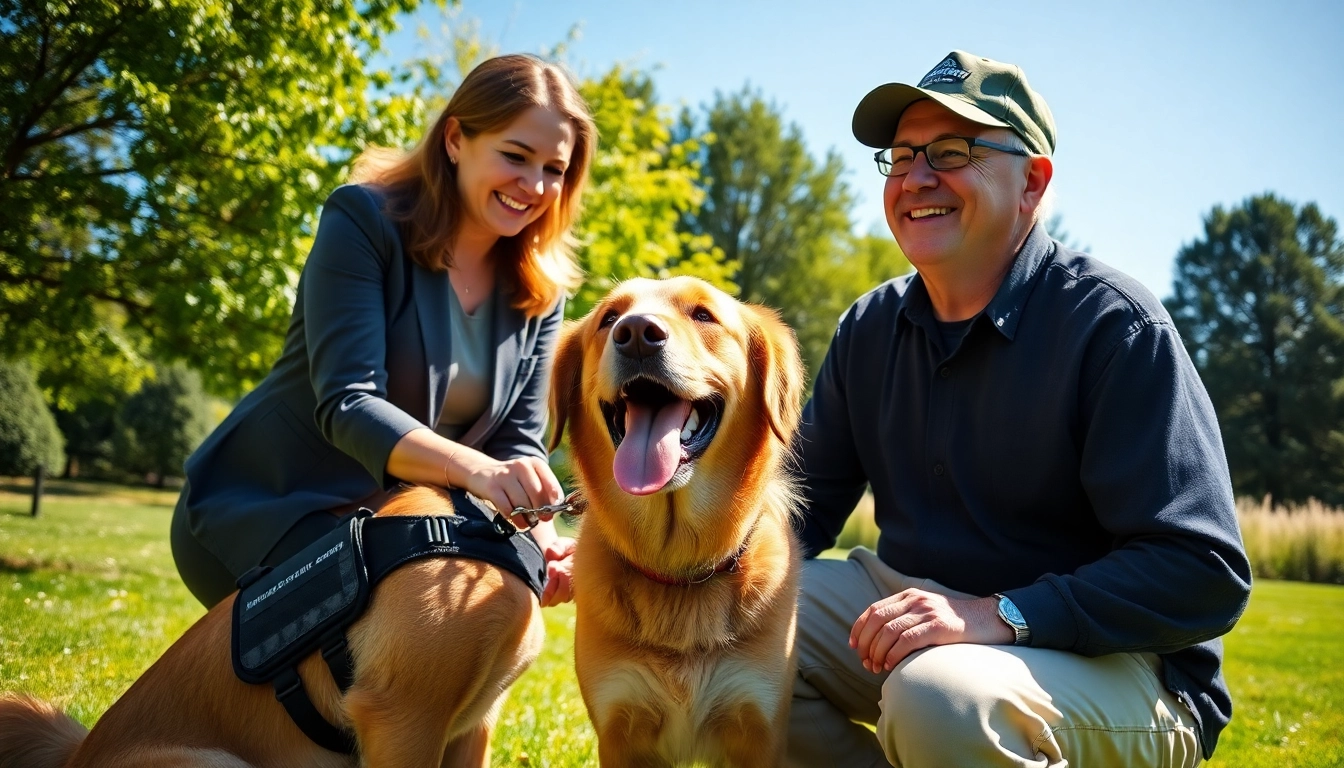Understanding PTSD and the Role of Service Dogs
What is PTSD?
Post-Traumatic Stress Disorder (PTSD) is a serious mental health condition that can develop after experiencing or witnessing a traumatic event. Symptoms often include flashbacks, severe anxiety, nightmares, and uncontrollable thoughts about the event. Individuals with PTSD may withdrawal from social situations, experience heightened vigilance, and have difficulty regulating emotions. It can affect anyone, not just those in combat; survivors of accidents, natural disasters, or personal assaults also face the emotional aftermath. The impact of PTSD can be isolating and debilitating, leading to challenges in personal, social, and professional realms.
The Benefits of Service Dogs for PTSD
Service dogs have proven to be invaluable companions for individuals dealing with PTSD. These specially trained animals offer numerous benefits that can foster healing and enhance overall well-being. Some of the key advantages include:
- Emotional Support: Dogs provide unconditional love and companionship, which can combat feelings of isolation and loneliness.
- Grounding Techniques: During anxiety or flashback episodes, a service dog can help ground the individual by providing physical contact, which can significantly reduce panic attacks.
- Increased Safety: Service dogs are trained to recognize signs of distress in their handlers and can alert them or others when interventions are needed, such as during episodes of heightened anxiety.
- Enhanced Routine: Owning a service dog necessitates a daily routine, which can help individuals with PTSD regain a sense of normalcy and control in their lives.
How Service Dogs Can Improve Quality of Life
Integrating a service dog into daily life can dramatically improve the quality of life for individuals with PTSD. With consistent companionship, emotional bonds strengthen, fostering resilience and hope. Many find that their service dogs enhance their social interactions by even acting as a social bridge. These dogs can encourage their owners to engage in outdoor activities and participate in events they may have otherwise avoided. The dependence on the dog for support can facilitate motivation to pursue therapy, medication, and other forms of treatment, making the path to recovery more navigable.
Choosing the Right PTSD Service Dog
Identifying the Best Breeds for PTSD Support
Selecting the right breed of service dog is critical to matching the needs of the individual. While various breeds can serve effectively, some are recognized for their inherent characteristics that are well-suited for PTSD support. Breeds such as Labrador Retrievers, Golden Retrievers, German Shepherds, and Poodles are often favored for their intelligence, temperament, and ability to connect with their handlers. Each breed has specific traits that might cater to different needs, such as energy levels or hypoallergenic fur, which should be carefully assessed based on the individual’s lifestyle and preferences.
Assessing Temperament and Training Needs
The temperament of a service dog is crucial when it comes to supporting someone with PTSD. A suitable dog should be calm, patient, and sociable. This gradual assessment can be conducted through meeting various dogs in controlled environments. Training is also a vital consideration; individuals should ensure that their chosen dog has received professional training or is on track to be trained for specific tasks relevant to PTSD. Handlers should consider whether they will be adopting an already-trained dog or whether they are prepared to take on the role of training a younger dog.
Involving Professionals in the Selection
Consulting with professionals who specialize in service dogs can be incredibly beneficial in finding the right match. Trainers, animal behaviorists, and medical professionals can provide insights into what characteristics to prioritize based on the individual’s unique needs. They can help in assessing the appropriateness of a breed and the temperament of individual dogs. Further, these professionals can clarify expectations around training needs and ongoing support that may be handy, encompassing advice on how to navigate the dog-handler relationship effectively.
Where to Find PTSD Service Dogs for Sale
Reputable Breeders and Organizations
When considering bringing a service dog into your life, sourcing from reputable breeders or organizations is paramount. Seek out organizations that focus on training dogs for PTSD and have a history of successful placements. These organizations often follow ethical breeding practices, ensuring that their dogs possess the necessary temperament and health standards. Recommendations from mental health professionals can also guide potential buyers in identifying trustful breeding operations.
Online Resources for PTSD Service Dogs for Sale
The internet can serve as a tool for finding PTSD service dogs for sale. Numerous websites cater specifically to connecting potential handlers with service dogs. These platforms often include detailed profiles for each dog, including their training status and temperament assessments. However, it’s vital that potential buyers verify the legitimacy of any online listings by conducting thorough research and reaching out for references.
What to Look for in a Seller
When purchasing a PTSD service dog, certain standards can help discern reputable sellers from those taking shortcuts. Key elements to evaluate include:
- Transparency: A good seller should provide clear information about the dog’s breed, training, and health history.
- Documentation: Request proof of training certification and health checks. Legitimate organizations will offer this documentation without hesitation.
- Support: Consider the level of post-purchase support the seller provides, including training guidance and resources.
- Reputation: Research online reviews to understand other customers’ experiences with the seller.
Understanding the Training Process
Types of Training for Service Dogs
Training for PTSD service dogs comprises various modalities tailored to meet the individual’s specific needs. Common training types include:
- Socialization: Early socialization is critical to expose service dogs to different environments, people, and situations.
- Task-Specific Training: This may involve teaching the dog to recognize signs of anxiety or panic attacks, providing deep pressure therapy, or performing distraction tasks during episodes.
- Obedience Training: This foundational training establishes the dog’s responsiveness to commands and improves the handler’s control.
Post-Adoption Training Opportunities
After bringing a service dog into their lives, handlers may find it beneficial to pursue additional training. Many organizations offer post-adoption training programs tailored to further refine the dog’s skills and address any specific situational needs that arise. Engagement in these programs fosters an ongoing bond and enhances the effectiveness of the service dog’s assistance in managing PTSD.
How to Reinforce Training at Home
Handlers can support the training process at home by practicing commands, reinforcing good behavior, and engaging in stimulating activities that promote mental and physical well-being. Utilizing positive reinforcement techniques, such as rewards and praise, encourages desired behavior and strengthens the dog-handler relationship. Regularly incorporating training sessions into daily routines can also help maintain the skills learned and provide valuable bonding experiences.
Success Stories and Testimonials
Real-Life Stories of PTSD Service Dog Matches
Many individuals have shared inspiring stories reflecting the transformative effects of service dogs on their lives. For example, a veteran with severe PTSD reported that his service dog not only helped him navigate social interactions but also significantly reduced his anxiety levels when out in public. The dog became a constant reminder that he was supported and understood, breaking the cycle of isolation he once endured.
Challenges Faced and Overcome
The path to integrating a service dog into one’s life is not without challenges. Common obstacles may include training setbacks, behavioral issues, or, at times, the need to adapt to a new companion’s routine. Support groups and forums provide platforms where individuals can share their experiences, and seek advice, creating a community of shared understanding and resilience. Facing these obstacles head-on can often lead to the most rewarding experiences.
Long-Term Benefits of Having a Service Dog
The long-term benefits of having a service dog extend beyond immediate emotional support. Over time, many handlers report changes in their overall mental health, with fewer depressive episodes and a newfound sense of purpose. Furthermore, the companionship that service dogs provide can lead to improved physical health through increased activity levels and a reinforced routine, thereby enhancing a person’s overall lifestyle and happiness.



